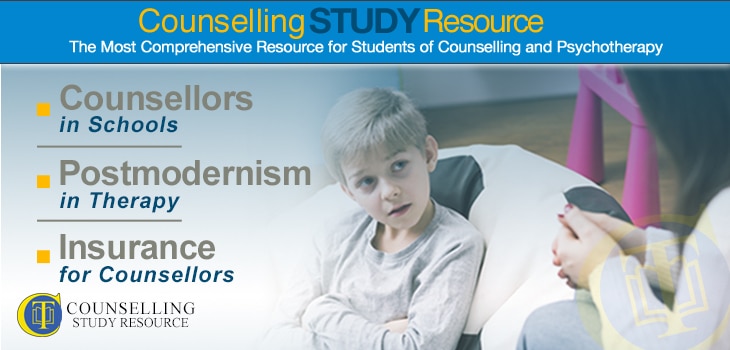033 – Counsellors in Schools – Postmodernism in Therapy – Insurance for Counsellors
In episode 33 of the Counselling Tutor Podcast, Rory Lees-Oakes and Ken Kelly talk about the growth of counselling in schools. ‘Theory with Rory’ decodes ‘postmodernism’ and discusses how this affects the world of counselling and psychotherapy. Finally, the presenters discuss the importance of having professional indemnity insurance.
Counsellors in Schools (starts at 2.12 mins)
There is talk of ensuring that all schools in the UK have their own counselling service. A pilot project in Wales showed successful results. Children and young people these days face life in a complex world with many pressures; this can lead to feelings of overwhelm. It can be difficult or impossible for youngsters to share their concerns with relatives, especially when family may be part of the problem.
Rory and Ken are strongly in favour of the development of such services, explaining that there would be benefits to:
- children and young people themselves – having the chance to speak confidentially to an independent person about any problems
- counsellors – bringing increased employment opportunities
- trainers in specialist skills for counselling children and young people – being able to offer this training to more counsellors.
Ken and Rory assert that there is an ethical requirement for counsellors working in this field to have dedicated training. This is supported by the Ethical Framework for the Counselling Professions of the British Association for Counselling and Psychotherapy (BACP): ‘Careful consideration will be given to working with children and young people that … demonstrates knowledge and skills about ways of working that are appropriate to the young person’s maturity and understanding’ (page 8).
Counsellors in this field need to ensure they have the right skills and knowledge, for example of child development, social media, current recreational drugs and the Fraser guidelines. But don’t be tempted to try to ‘get down with the kids’: teenagers generally see through this as unreal.
Counsellor Tutor Podcast 15 looked at counselling young people, and you can also watch this lecture by counsellor Catherine Knibbs on working with young people here.
Postmodernism in Therapy (starts at 15.42 mins)
What is postmodernism? Here, Rory ‘decodes’ the term, explaining that it refers to a mind-set that encompasses a general distrust of theories and ideologies that seek to slot all knowledge into a single framework. In other words, postmodernism challenges the ‘big ideas’ that we might assume to be true, and asks us to deconstruct and critically evaluate them.
Rory looks at the history of postmodernism. In the 1600s, religion lost its monopoly in the West in explaining reality, with science taking over and leading to the Industrial Revolution in the 18th and 19th centuries. The ‘big ideas’ of commerce, science, literature, art and psychology formed important parts of the modernist era, while postmodernism (which followed modernism historically) represented a questioning by philosophers of the genuine usefulness of these ideas to contemporary society.
In the world of therapy, the ideas of Sigmund Freud, Albert Ellis and Carl Rogers could be said to be modernist, since they all rely on particular theories. Postmodernist therapies, meanwhile, are highly relational, collaborative and phenomenological; they enable clients to deconstruct and examine their beliefs and the value they place on these. There are two main modalities in postmodern therapy:
- narrative therapy – which evaluates the client’s thoughts and behaviours in the context of their culture and the story they have written for themselves
- solution-focused brief therapy – which creates solutions to problems rather than evaluating the root causes of these problems.
Insurance for Counsellors (starts at 23.30 mins)
Whether you are qualified and in practice, or a student on placement, it is important to have your own professional indemnity insurance, as required by the BACP’s Ethical Framework: ‘We will be covered by adequate insurance when providing services directly or indirectly to the public.’ It also makes good financial sense to ensure you have insurance cover, since we live in an increasingly litigious society, and claims can prove extremely expensive.
Ken and Rory offer three top tips on insurance:
- When deciding which company to go with, phone up and see what impression you get, and what’s on offer. For example, some offer continuing professional development (CPD) and/or access to document libraries.
- Once you’ve bought a policy, always read the documentation – there may well be conditions (e.g. on note-taking, supervision and CPD) that you must adhere to for the insurance to be valid.
- Even if your agency says it has its own insurance, always take out your own too – sometimes an organisation can refuse to claim on its insurance for cost reasons.


